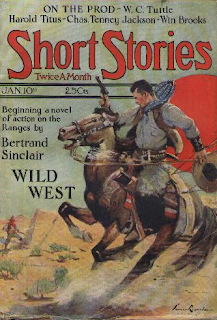
Following Friday's post...
A couple of months ago, Vancouver's Ronsdale Press reissued The Inverted Pyramid, thus becoming the first Canadian house to in over eight decades to publish Bertrand W. Sinclair. Their choice was apt, I think. Sinclair didn't think of the novel as his best work – that would be Poor Man's Rock (1920) – but, as dedicated biographer Betty Keller tells us in Pender Harbour Cowboy, he'd hoped to be remembered for this "literary" novel.
 First published in January of 1924 by Little, Brown, like The Hidden Places, The Inverted Pyramid is touched by the Great War. It tells the story of brothers Rod and Grove Norquay, and their divergent dreams for a family fortune that had been built on BC timber. Ronsdale describes the book as having been "a best-seller". An imprecise term to be sure, but still I can't agree. Back in 1923, Little, Brown had become so certain that the book would not be a best-seller that it sought to avoid the competitive Christmas market by postponing publication until the new year. There was no second printing, though A.L. Burt did produce one of its cheap editions. One could dismiss the relatively low sales as self-fulfilling prophecy – Little, Brown chose not to advertise the book – but evidence points to an overall lack of interest in this new, higher-brow Sinclair. Despite strong reviews, The Inverted Pyramid became the one novel that his agent failed place as a serialization.
First published in January of 1924 by Little, Brown, like The Hidden Places, The Inverted Pyramid is touched by the Great War. It tells the story of brothers Rod and Grove Norquay, and their divergent dreams for a family fortune that had been built on BC timber. Ronsdale describes the book as having been "a best-seller". An imprecise term to be sure, but still I can't agree. Back in 1923, Little, Brown had become so certain that the book would not be a best-seller that it sought to avoid the competitive Christmas market by postponing publication until the new year. There was no second printing, though A.L. Burt did produce one of its cheap editions. One could dismiss the relatively low sales as self-fulfilling prophecy – Little, Brown chose not to advertise the book – but evidence points to an overall lack of interest in this new, higher-brow Sinclair. Despite strong reviews, The Inverted Pyramid became the one novel that his agent failed place as a serialization.
"The Inverted Pyramid's poor showing in the bookstores had made him cautious about returning to literary novels in a hurry", writes Keller. "He opted to play it safe..." This meant falling back on pulp magazines – wells from which he drew until the 'forties, when they began to run dry.
It's interesting to consider that Sinclair's books, all novels, represent nothing more than a small percentage of his work. The pulps published over two hundred of his short stories; one encounters them from time to time in anthologies like Best Mounted Police Stories and Vancouver Short Stories, but they otherwise remain in the forgotten past.
Reading Betty Keller's very fine biography, one can't help but wish for a collection of Sinclair's stories. Let's not let another eight decades pass.




_-_Plate_14.jpg)









